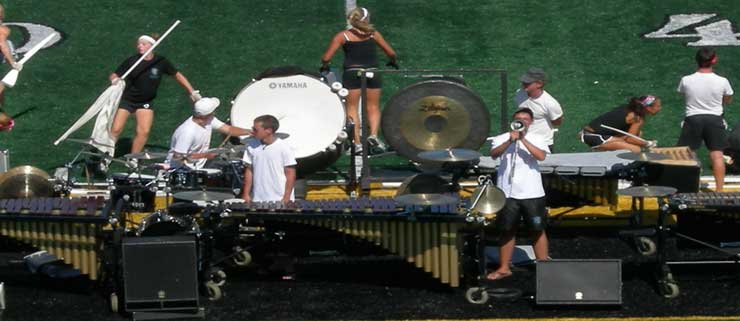 Many current music educators grew up in a time when being in an ensemble was solely about playing the music for the next concert. I did not realize until many years later that this method of teaching had set me up for years of mediocrity and frustration.
Many current music educators grew up in a time when being in an ensemble was solely about playing the music for the next concert. I did not realize until many years later that this method of teaching had set me up for years of mediocrity and frustration.
{mosimage}Many current music educators grew up in a time when being in an ensemble was solely about playing the music for the next concert. I personally cannot recall ever doing a worksheet or any real music theory work while in high school. It seemed that all I had to do to get an "A" was come to my lessons, play at the concerts, and otherwise stay out of trouble. Outside practice was expected but not enforced. I did not realize until many years later that this method of teaching had set me up for years of mediocrity and frustration.
How Do Easy A's Hurt Students?
The primary effect of giving a student an A for doing very little work produces much the same effect that we see in society where people become dependent on entitlement programs. Being given something for nothing slowly undermines a person's motivation and softens their personal initiative. In the music classroom this translates into producing a stagnant musician that has no driving force to improve his or her musical abilities. For many years I suffered with wondering why the members of my ensemble wasn't improving the way I felt they should. Finally I concluded that it was my fault for not pushing them hard enough. I had fallen back into my mentor's footsteps and had been cranking out the easy A's to my students regardless of what they truly deserved.
How To Determine An Appropriate Grade:
The grading rule of thumb that is used in other classes should also be used in the music classroom. This rule of thumb states that an A is to be reserved for excellent work while a C is given for work that is simply average. If you were to take this rule and apply it to your students, would they get the same grade that you gave them on their last report card? How did they come to earn the A that they received? Was it simply for showing up to class or was there real, verifiable learning going on?
Requiring More Of Your Students Often Means Better Results:
The day that I realized my mistake and started requiring more work from my students the ensemble seemed to blossom almost overnight. I began requiring two hours of home practice each week, weekly theory worksheets, and mandatory private lessons or group sectionals. By the next concert I was already seeing a difference. By the end of the third quarter the new scale memorization requirements I threw in had turned my jazz and pep bands into the best groups that I had ever conducted. The attitudes of my students also changed. They realized that they were improving and that their hard work was indeed paying off. This in turn made them more interested in performing and made them want to practice even more.
Perhaps most important of all, requiring more of my students also required more of myself as a teacher. I started reading educational journals again, determined to improve myself as a conductor and as a teacher. I started writing about my experiences to help other people improve and learn from my mistakes. These simple things breathed new life into a career that was on the verge of being consumed by apathy. I love teaching again, and it is all because I finally broke free from the bonds of being a mediocre band director. If you care for your students and want them to come to love and appreciate music as much as you do, never again give away and easy A.







 Scroll down to view the comparison chart of over a dozen different portable digital audio recorders.
Scroll down to view the comparison chart of over a dozen different portable digital audio recorders.